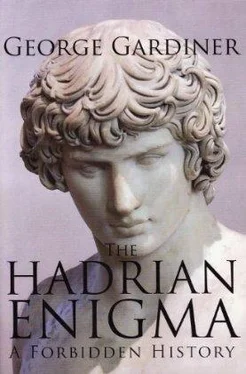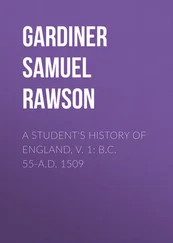George Gardiner - A Forbidden History.The Hadrian enigma
Здесь есть возможность читать онлайн «George Gardiner - A Forbidden History.The Hadrian enigma» весь текст электронной книги совершенно бесплатно (целиком полную версию без сокращений). В некоторых случаях можно слушать аудио, скачать через торрент в формате fb2 и присутствует краткое содержание. Жанр: Исторические приключения, на английском языке. Описание произведения, (предисловие) а так же отзывы посетителей доступны на портале библиотеки ЛибКат.
- Название:A Forbidden History.The Hadrian enigma
- Автор:
- Жанр:
- Год:неизвестен
- ISBN:нет данных
- Рейтинг книги:5 / 5. Голосов: 1
-
Избранное:Добавить в избранное
- Отзывы:
-
Ваша оценка:
- 100
- 1
- 2
- 3
- 4
- 5
A Forbidden History.The Hadrian enigma: краткое содержание, описание и аннотация
Предлагаем к чтению аннотацию, описание, краткое содержание или предисловие (зависит от того, что написал сам автор книги «A Forbidden History.The Hadrian enigma»). Если вы не нашли необходимую информацию о книге — напишите в комментариях, мы постараемся отыскать её.
A Forbidden History.The Hadrian enigma — читать онлайн бесплатно полную книгу (весь текст) целиком
Ниже представлен текст книги, разбитый по страницам. Система сохранения места последней прочитанной страницы, позволяет с удобством читать онлайн бесплатно книгу «A Forbidden History.The Hadrian enigma», без необходимости каждый раз заново искать на чём Вы остановились. Поставьте закладку, и сможете в любой момент перейти на страницу, на которой закончили чтение.
Интервал:
Закладка:
The assembly emitted another rush of murmurs. Kenamun continued.
"Further, great sirs, though he was discovered under the river's waters, water damage to his skin and organs was minor. Prey-seeking river vermin are far more aggressive to a corpse over time than was evident on this youth. I believe he had been in the water less than even a single hour prior to his detection.
Considering the incision at his wrist, unless he razored his wrist just moments before he entered the water, he would have been unconscious from blood loss long before he entered the river. It takes time for a living creature to be drained entirely of its blood, as we see at a slaughter man's killing trough."
Suetonius decided to probe this notion closer.
"Priest Kenamun, couldn't he have cut his wrist by accident at the river's edge and then fallen in after fainting? Or cut and thrown himself in as a willing suicide?"
"This is possible, but I doubt it. Far more blood would have gelled in his veins than was apparent when we prepared his body. I sense the incision was made sometime well before him entering the river. This could mean it was inflicted elsewhere than at the river.
I am told too Antinous was left-handed in his activities, yet this incision was in his left not his right wrist. This is unusual. It is irregular.
I believe therefore his arm was lanced in the company of another person or persons to promote bleeding. And then, when his life's humors had been diminished by his own failing spirit, further manipulation may have been applied externally to complete the job. This is just as a butcher does with a beast to drain it of polluting blood. Perhaps only then was his body placed in the river."
The assembly grew agitated and edgy.
"How would someone slit a healthy young person's wrist while they were fully capable of resisting such an attack, unless they were party to their own death? Antinous was no helpless weakling," Suetonius asked rhetorically.
"I don't know," Kenamun offered. "Perhaps he was restrained and it was forced upon him? Perhaps he was given a blow to be unconscious? Or perhaps he was eager to be incised?"
"But why would someone wish to bleed a victim so thoroughly?"
"It is seen by some to be a less painful way to die than other methods. I understand slit veins are a noble tradition among Romans pursuing a pain-free death? But in truth I do not know, Special Inspector."
Suetonius turned to the craggy high priest standing nervously in anticipation beside the mortician.
"Pachrates, high priest and magus of Amun, is it true you promised the youth you had the skill to revive him from death if he aspired to sacrifice himself on the occasion of The Isia? We have been told you have exhibited such skills."
The self-professed wizard uncharacteristically trembled.
"By Sacred Amun! what can you mean?! My magic does not dare indulge in such blasphemies against Fate."
"Yet you are known to resurrect from death small animals and the occasional condemned criminal with your arts? It has been testified so by witnesses. You do it in public before us."
The priest was quick to respond.
"This is a lesser, minor, inferior Egyptian magic, Inspector, suited only to meager creatures like dogs, criminals, and other vermin. I do not perform magic with the bloodstream and honor of nobles of the Imperium!
Besides, Inspector, my humble arts are only effective at times of an extraordinary alignment of the stars, configurations which occur only once or twice a lifetime," the sorcerer explained unpersuasively.
"Yet, priest of Amun, we have been told the youth Antinous prevailed upon you to perform such magic? We have a witness to your conversation in our written testimony. The youth had seen your magic in action, and requested your special powers be used for his own purpose? This was in the company of Caesar too, we have been told?"
Clarus was becoming tense at the direction the deposition was taking. It veered too close to Caesar's person.
"But I refused him! I said No!" the magus objected. "And then Great Pharaoh intervened to refuse both of us to even discuss the matter! Caesar had spoken! The matter was final!"
Suetonius zeroed in for his coup-de-grace, he thought.
"Nevertheless, Priest, you had sufficiently remarkable prescience to summon priests at Memphis and Thebes to this place, including the very faraway Oracle from Siwa," Suetonius charged, "plus an entire embalming team including Cronon, a Greek painter of funerary portraits from Fayum. They were obliged to travel long distances to this place in anticipation of the youth's death?"
Suetonius felt pleased with himself in this proposition. The assembly rustled with murmurings.
Pachrates rose to the fullest height of his diminutive race, his eyes ablaze.
"You take liberties with our sacred mission, Inspector! This is not so, I tell you!"
Suetonius had struck an open nerve.
Hadrian interrupted this exchange wearily. With a dismissive wave of one hand, he spoke.
"Suetonius Tranquillus, you should be told how the priests and personnel you list were summoned here on my command two months ago. These people are engaged with the planning of our new city of Hadrianopolis. You will hear more about this project shortly.
Pachrates is an honored advisor to us for this purpose. His understanding of the local customs is comprehensive, so he advises us how the various communities of Romans, Greeks, and Egyptians can live in harmony at Hadrianopolis someday. There was no conspiracy in his summons to his artisan compatriots, Inspector. It was on my own authority he did so. Leave it alone, Tranquillus."
Caesar had spoken. Pachrates resumed his usual confident manner.
"I welcome your words, my lord, however there is more to explore," Suetonius continued bravely, if doggedly. His leap of intuition had failed; he moved on.
"We think we know those around us, but we don't really know them at all. There are several undercurrents flowing among us here, tides which might carry us in unwanted directions. Antinous may have been swept along by more than the Holy River's currents."
"Be plain, Inspector. No riddles," Hadrian sniped. His appearance was growing haggard.
Suetonius stepped out in a dangerous direction.
"Take the women among us, for example, Caesar. Julia Balbilla, princess of Commagene and gentlewoman companion to our Great Augusta, your wife, has been outraged by the recorded revelation how her astrologer grandfather in the time of Nero advised his emperor to kill his own counselors.
Her notorious ancestor, Balbillus the Wise, interpreted a comet in the sky to foretell that Nero would die. Rich with the mystical lore of the Orient, Balbillus advised Nero to nominate substitute deaths instead. He put it into Nero's head he should kill the eminent men-of-state of his era to deflect the omen's risk. So the notorious Piso and Vinicius Conspiracies against Nero were invented to fulfill this goal.
It was a most successful strategy, it seemed. Many innocents died cruelly and their families and slaves with them. Their rich properties were confiscated by Nero into his own coffers. It was a winning play for both Nero and Balbillus."
"What has this to do with the death of Antinous?" Hadrian snapped.
"On occasions as you know, Caesar, your Bithynian companion was a guest in the Augusta's household. He and Julia Balbilla, as well as the empress with her retinue, shared playful conversation over wine and snacks. It doesn't strike me as too far-fetched to predict the grand-daughter of Balbilla the Wise could suggest to an impressionable youth how a substitute death was a feasible project for the lad. After all, we already know the youth was intent on some form of recompense, some form of self-sacrifice. Balbilla suggested; Antinous considered; Antinous died. The youth fulfilled his purpose."
Читать дальшеИнтервал:
Закладка:
Похожие книги на «A Forbidden History.The Hadrian enigma»
Представляем Вашему вниманию похожие книги на «A Forbidden History.The Hadrian enigma» списком для выбора. Мы отобрали схожую по названию и смыслу литературу в надежде предоставить читателям больше вариантов отыскать новые, интересные, ещё непрочитанные произведения.
Обсуждение, отзывы о книге «A Forbidden History.The Hadrian enigma» и просто собственные мнения читателей. Оставьте ваши комментарии, напишите, что Вы думаете о произведении, его смысле или главных героях. Укажите что конкретно понравилось, а что нет, и почему Вы так считаете.












